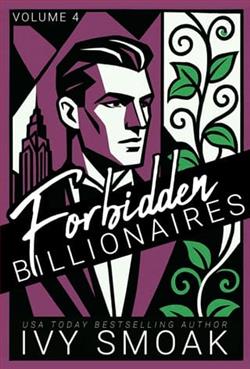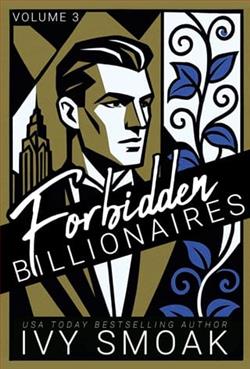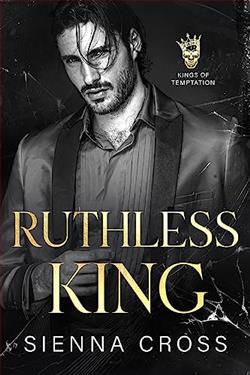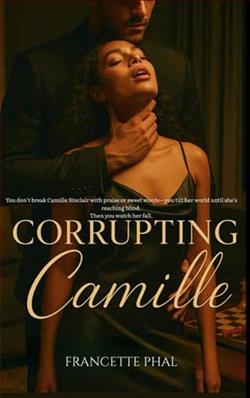Page 53 of Angel's Kiss
“How do you know?”
“Because, my dear boy, I’ve seen him at, shall we say, certainplaceswhere women are not welcome. Or needed. And he was having quite a good time.” Vincenzo winked and Raoul hid his face, not just because of the scandalous implications, but because he was utterly confused.
“So his tastes don’t run towards women? Have you and he—”
“Oh he’s far too full of himself for me. You know I like them shy and seasick,” Vincenzo grinned, and Raoul rose from the table so quickly he ran into it. Vincenzo laughed heartily again. “You’re easily offended on land. More reason for you to get back to the sea.”
“I need to go. I have things to think about,” Raoul mumbled and rushed out of the pub.
Why would Christine lie about the other man? Raoul should have known it wasn’t Rameau who was entangled with her. He had heardthatman’s voice in her dressing room and it had been unlike any voice he’d ever heard if he was to be honest. What on earth was this scoundrel hiding and what game had he forced on his friend?
––––––––
They had spent theentire day in music. It was magic to Erik, the way it could make time run differently. How it could transport them to the green hills of Éire to Venice’s canals and dark forests of the north. They had sung throughRigoletto, and for the first time since he had revealed himself as human, he had dared to sing with her. Perhaps her kiss had made him braver than ever before, but he was glad of the risk. It was magic as well to sing with another, to blend their breath in song nearly as intimately as in an embrace. It was the incredible desire to repeat that embrace that had made him end their lesson before he overstepped and did to her what the Duke had done to Gilda.
He wanted that too, of course, to embrace her again. Kissing her had felt so viscerally real and perfect. So had waking up next to her. But even that had been a torment when he had found himself hard and flustered by the pressure of her body against his. He’d retreated from his own bed and tried to wash away his desire with icy water. It had quelled the physical frustration, but not the lust. And so he’d played, the very song he had seduced her with as an angel, letting the music take his awful desire and make it into something beautiful. But he had stopped short when even that became too tempting.
A civilized day as teacher and student had proved an antidote. They had studied and laughed, and Christine had been insistent that he rest and heal. It had been wondrous, but now, huddled by the fire, gazing at her beauty in the golden light, he wanted nothing more than to kiss her again. He was on the couch alone, and she in her favorite chair by the fire, looking at the clock above the mantle, thoughtful and curious.
“How did you get from a little village here in France to Prague?” she asked, alerting Erik from his reverie. “And don’t tell me it’s a long story. Or a sad one.”
“Are you sure?” Erik’s stomach twisted at the darkness of the memories, the walls of the room seeming to grow closer around him. Sensing his apprehension, Christine rose from the chair and joined him on the couch. She was not so close as to trigger his instincts to run or recoil, just near enough to take his hand.
“I’m sure. I’ve been wanting to ask all day what happened...after.” She squeezed his hand, pushing back the memory of his mother dead on the cold ground before it could overtake him. “I want to know.”
“I don’t remember much about the next few days after my mother died. The Baroness took over, exiling her horrid son somewhere else. They buried my mother on the grounds, by the chapel Carl helped build. And then my grandmother gave him a thousand francs to disappear forever with me. He dragged me to Le Havre. I do remember seeing the ocean for the first time. It was so big and wild and it made me feel so small.”
“And it made the world a little less frightening, when you realized you were such a little thing compared to the sea and the earth and the sky,” Christine murmured, eyes cloudy with memory.
“Exactly,” Erik breathed. “We crossed the channel to Brighton, then traveled to London. Carl’s English was terrible, so he made me translate half the time, and the people we met were more than suspicious of a Frenchman with a young boy in a mask. When we got to London, we took rooms. I wouldn’t see him for days. He drank and gambled away the money in a few weeks, barely fed me. He intended us to go to Dublin and find someone from my mother’s family to leave me with. But then...”
Erik swallowed. It had been a long time since that first brief stint in London. He had been young and foolish enough then to hope it was a new beginning.
“What happened?”
“He was spending time among the seedier theaters and saw advertisements for a peculiar sort of show. One night, he came back to the room and fed me something that tasted wrong. I fell asleep and woke up in a cage in a rail car without my mask.”
“A cage?” Christine echoed in horror. Erik nodded tensely, hanging onto her soft hand and letting it anchor him before the past washed him away.
“I was scared. I screamed. But I wasn’t alone. There was a woman there with the blackest skin I’d ever seen. She told me not to be afraid, and that if I was good, no one would hurt me. I don’t think she meant to lie. Her name was Rose, and she informed me that she, like myself now, was the property of Klaus Steiner, an impresario.” Erik spat out the words. The decades had done nothing to dull his hate. “He had been on tour with Rose and a few others in London but we were on our way to his home now, to Vienna, where he kept his museum of livingoddities. His human zoo of freaks.”
“Vienna?”
“Steiner owned an establishment there. It was grand from the outside, but everything behind the curtains was rotten and terrible. There was a dozen of us in various forms of bondage to him. There was a man, Gus, with a third arm; this withered thing on his side that he could barely move. Phineas was covered in tattoos from head to toe. Ezra was covered in hair like a dog’s or some other creature. He escapes after a year. I envied him.
“Rose he exhibited as aHottentotAphrodite, or a Congo queen. She was neither. She’d been born in America and bought as a child. She didn’t know that owning people was illegal in Austria. None of us did and it didn’t matter. Steiner kept us in check with more than laws. Chains and cages and the whips of his assistants.” Erik’s free hand strayed to his wrist and the scars from the manacles that had bound him. Christine’s fingertips followed, and he looked away from the tears in her eyes.
“And there was Sebastian, another deformed boy, but he was different from me. He looked like a figure of clay the gods had twisted in the womb, human but distorted. He couldn’t speak or understand orders, but he was kind and gentle. He’d only listen to his sister, Constance. She took care of him and did her own act throwing knives and axes. But Sebastian was difficult to make cooperate, so I was to be Steiner’s new star.Der Lebendige Tod. The Living Death.”
“How old were you?” Christine asked in horror.
“Eight, when I came to Vienna. Nearly nine. I know because it was winter, and it was freezing in the place he kept me. He thought he could break me quickly, with steel and pain and cold. But I’d seen worse. I refused to even speak. But that meant I couldn’t sing to console myself. But then, he put me in...”
Christine grasped his hand and he held on tight.
“It was built as a carnival maze, but it didn’t make any money, so Steiner repurposed all those mirrors into a new sort of prison for freaks like Sebastian and me. The worst thing he could make us do was look at our own terrible faces. He shut me in that little room with a lamp and walls of mirrors in his cellar. It was a torture chamber.”
He stopped, shutting his eyes against the memory of his face multiplied a hundred times, screaming in those awful mirrors.















